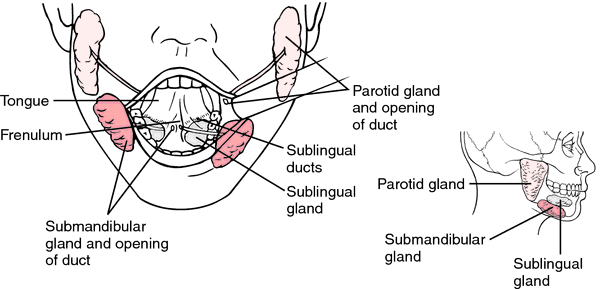Medical term:
salivary
salivary
[sal´ĭ-ver-e]pertaining to the saliva.
salivary glands the glands in the mouth that secrete saliva. The major ones are the three pairs known as the parotid, submaxillary, and sublingual glands (see Plates); there are other smaller salivary glands within the cheeks and tongue. The largest are the parotids, located below and in front of each ear. Saliva secreted by these glands is discharged into the mouth through openings in the cheeks on each side opposite the upper teeth. The submaxillary glands, located inside the lower jaw, discharge saliva upward through openings into the floor of the mouth. The sublingual glands, beneath the tongue, also discharge saliva into the floor of the mouth.
The saliva is needed to moisten the mouth, lubricate food for easier swallowing, remineralize the tooth surface, and provide the enzyme (ptyalin) necessary to begin food breakdown in the preliminary stage of digestion. The salivary glands produce about 1.5 liters of saliva daily.
The salivary glands are controlled by the nervous system. Normally they respond by producing saliva within 2 or 3 seconds after being stimulated by the sight, smell, or taste of food. This quick response is a reflex action.
In mumps (parotitis), the parotids become inflamed and swollen. Occasionally, salivary glands produce too much saliva; this condition is called ptyalism, and is the result of local irritation from dental appliances or of disturbances of digestion or of the nervous system or other causes. Certain diseases, drugs such as morphine or atropine, and nutritional deficiency of vitamin B can result in decreased secretion of saliva.
The saliva is needed to moisten the mouth, lubricate food for easier swallowing, remineralize the tooth surface, and provide the enzyme (ptyalin) necessary to begin food breakdown in the preliminary stage of digestion. The salivary glands produce about 1.5 liters of saliva daily.
The salivary glands are controlled by the nervous system. Normally they respond by producing saliva within 2 or 3 seconds after being stimulated by the sight, smell, or taste of food. This quick response is a reflex action.
In mumps (parotitis), the parotids become inflamed and swollen. Occasionally, salivary glands produce too much saliva; this condition is called ptyalism, and is the result of local irritation from dental appliances or of disturbances of digestion or of the nervous system or other causes. Certain diseases, drugs such as morphine or atropine, and nutritional deficiency of vitamin B can result in decreased secretion of saliva.

The salivary glands. From Jarvis, 2000.
salivary gland inclusion disease cytomegalic inclusion disease.
Miller-Keane Encyclopedia and Dictionary of Medicine, Nursing, and Allied Health, Seventh Edition. © 2003 by Saunders, an imprint of Elsevier, Inc. All rights reserved.
sal·i·var·y
(sal'i-vār'ē),Relating to saliva.
Synonym(s): sialic, sialine
[L. salivarius]
Farlex Partner Medical Dictionary © Farlex 2012
salivary
(săl′ə-vĕr′ē)adj.
1. Of, relating to, or producing saliva.
2. Of or relating to a salivary gland.
The American Heritage® Medical Dictionary Copyright © 2007, 2004 by Houghton Mifflin Company. Published by Houghton Mifflin Company. All rights reserved.
salivary
adjective Relating to the saliva or salivary gland.Segen's Medical Dictionary. © 2012 Farlex, Inc. All rights reserved.
sal·i·var·y
(sal'i-var-ē)Relating to saliva.
Synonym(s): sialic, sialine.
Synonym(s): sialic, sialine.
[L. salivarius]
Medical Dictionary for the Health Professions and Nursing © Farlex 2012
sal·i·var·y
(sal'i-var-ē)Relating to saliva.
Synonym(s): sialic, sialine.
Synonym(s): sialic, sialine.
[L. salivarius]
Medical Dictionary for the Dental Professions © Farlex 2012
Latest Searches:
Voraxaze - Voranil - Voorhoeve - voodoo - VOO - Vontrol - von - vomitus - vomiturition - vomitory - vomitoria - vomito - vomitive - vomiting - vomit - vomica - vomerovaginalis - vomerovaginal - vomerorostralis - vomerorostral -
- Service manuals - MBI Corp